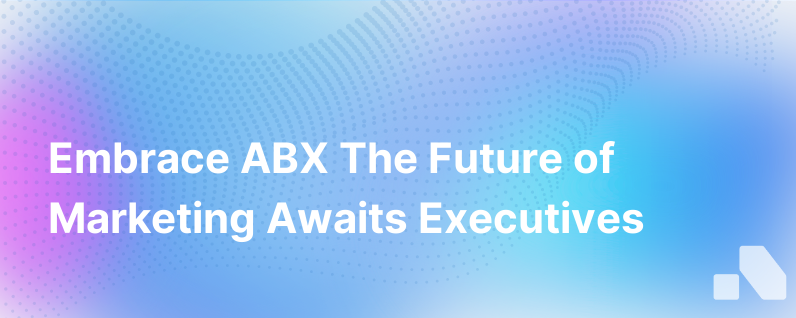
As B2B sales become increasingly competitive and buyer-centric, investment in account-based experience (ABX) becomes a necessity for modern marketers. ABX represents a true shift in marketing philosophy because it prioritizes individual account experiences and delivering personalized engagement at every touchpoint throughout the buyer's journey, not just at the top of the funnel.
The ABX Framework - A Paradigm Shift from ABM
Since at least the 1990s, account based marketing has been the go-to framework for high-performing enterprise B2B engagement. ABM focuses on identifying high-value accounts and targeting them with personalized campaigns, often resulting in higher win rates and greater overall sales efficiency. However, the ABM playbook has limitations; it sometimes fails to fully acknowledge the evolving, non-linear nature of modern buyer journeys and can leave out other essential players, such as sales and customers success.
ABX's innovation is in extending the personalized focus of ABM to integrate and tailor experiences across marketing, sales, and post-sales activities.
Understanding the ABX Model
ABX is a holistic relationship strategy that incorporates three key elements:
- Data-driven Insight: ABX employs analytics and actionable intelligence to understand customer triggers and behaviors, accommodating the account's needs even before they articulate them.
- Personalized Engagement: Leveraging insights from account research, ABX enables hyper-personalized campaigns that resonate with the specific pain points, aspirations, and business contexts of an account.
- Cross-functional Synchronization: Unlike ABM, which is often marketing-led, ABX fosters deep collaboration across sales, marketing, and customer service teams to present a united, context-informed front to the client.
The Competitive Edge Offered by ABX
Here's how ABX makes a difference for marketing and sales performance over less structured approaches:
- Increased Relevance: Messaging and interactions are not just targeted but are also deeply relevant and timely.
- Improved Customer Experience: Buyer touchpoints are more personalized, leading to higher trust and satisfaction.
- Efficiency in Resource Utilization: ABX minimizes wasted efforts on poorly fitted accounts or mistimed outreaches, ensuring better ROI on marketing investments.
Navigating the Challenges of ABX Integration
Transforming from a broad-focused marketing approach to ABX is not without its hurdles. Some challenges include:
- Ensuring data streams from multiple sources are clean, collated, and actionable.
- Breaking silos between departments to ensure fluid cross-functional collaboration.
- Keeping the engagement consistently personalized across the entire customer lifecycle.
Making the Transition to ABX
Here's a quick guide for marketers gearing up for ABX:
- Assess And Integrate Data Infrastructure: Ensure that your CRM and business analytics tools are integrated and optimized to offer real-time, actionable insights.
- Develop an Inter-Departmental Framework: Create cross-functional teams led by ABX champions that foster sharing of insights and strategies uniformly.
- Train Your Teams: Equip your teams with the understanding and tools necessary to implement ABX at every customer touchpoint.
- Leverage Technology: Consider employing AI-driven platforms, like Aomni, that synthesize complex data into digestible insights, aiding in crafting those personalized experiences efficiently.
- Opt for Incremental Change: Rather than an abrupt shift, gradually implement ABX within your organization, building upon early successes and scaling what works.
Measuring ABX Success
To gauge the effectiveness of your ABX initiatives, track metrics like:
- Engagement scores across personalized campaigns
- Sales cycle lengths and any changes therein
- Customer lifetime values and retention rates
- Feedback through customer satisfaction surveys
The Future Is ABX-Centric
In the digital-first marketplace, buyers expect engagements to be reflective of their unique challenges, solutions tailor-made to their problems, and each interaction to be more meaningful than the last. Hence, ABX is no longer optional but a differentiator that defines market leaders.
Leveraging Tools Like Aomni for Your ABX Strategy
Integrating ABX into your sales strategy could appear daunting, but it doesn't have to be. Advanced AI platforms like Aomni are designed to provide the crucial backing marketers need - from real-time account insights, competitive analysis to personalized content creation. These tools are veritable allies, smoothing out the ABX adoption curve and steering B2B marketers onto a path of strategic, high-impact sales engagement.
Marketers who adopt and refine their ABX strategies will position themselves to win more deals, cultivate deeper customer relationships, and stand apart in a crowded marketplace. In our opinion, the question isn't if you're ready for ABX, but rather how quickly you can embrace its principles to elevate your sales and marketing game?